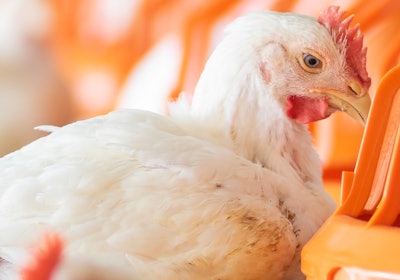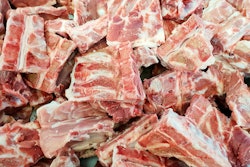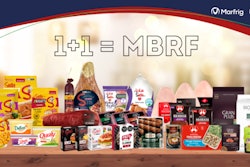
For the first-half of the financial year (to March 31, 2025), South Africa's Astral Foods reports total revenue of more than 10.72 billion rand (ZAR; US$598 million). That amounts to a year-on-year increase of 3.5%.
Despite the higher sales, operating profit (before interest and taxes) for the company was down 51% compared to the same period of 2024 at just under ZAR271 million. At ZAR182 million, profit for the reporting period was 49% lower year-on-year.
Headline earnings per share are down 54% at 409 South African cents.
Ahead of the release of the latest fiscal results, Astral Foods issued a profit warning.
Among the factors influencing its recent performance, the firm highlights increased poultry feed prices, which were driven by the impacts of a drought on the South African corn harvest in 2024. As the firm worked to balance supply and demand, it reduced broiler placements, and sold products from stock. Stronger competition in the local market and retail promotions reduced selling process for poultry meat.
In partial mitigation, Astral Foods reports that broiler growing performance was better than in the comparable period of 2024. However, overall broiler margins were negative.
Diesel and water supplies continue to challenge the business. Furthermore, disruption caused by a cybersecurity issue earlier this year cost the company an estimated ZAR20 million.
Poultry operation: higher sales, negative margin
Astral Foods is a vertically integrated poultry producer.
For the latest six-month period, it reports a 1.5% year-on-year increase in revenue for its Poultry division of ZAR8.8 billion. However, selling prices were down 3.1%, while costs were driven up by rising feed prices and other costs hit by inflation. As a result, the business posted a loss of ZAR26 million. This compares with a profit of ZAR284 million in the first half of 2024.
At close to 11,000 metric tons (mt), the firm’s broiler sales volume was 4.4% higher at around 5.6 million birds per week. At 52%, individual quick-frozen (IQF) mixed portions are the leading product group for Astral Foods by volume, followed by further processed (20%) and fresh (13%). Value-added, IQF single portions, and frozen make up the balance of the firm’s sales.
For the six-month period, broiler feeds prices were 2% higher year-on-year, due to the effects of the recent drought on corn prices.
At 31,143 mt, poultry meat imports into South Africa were around 1,400 mt lower in the review period. Brazil is the main supplier.
Company data on the main players in the South African chicken meat market put Astral Foods as leader with a 28% share, followed by Rainbow (22%), Country Bird (10%), and Sovereign (8%).
Sales volume, revenue up for Astral’s Feed business
Expanded sales volume and higher prices combined to boost the revenue of the firm’s feed business by 9.4% year-on-year to ZAR5.3 billion.
Overall, the volume sold was 5.9% higher at almost 38,000 mt. Third-party sales increased by 6.4% compared with the first half of 2024 — mainly as result in the recovery of South Africa’s laying hen population following a series of avian influenza outbreaks during 2023. Furthermore, internal sales were bolstered by increased demand for breeder feed as flocks were restocked following bird flu.
At ZAR297 million, operating profit for Astral Foods’ feed business increased by 11.6% year-on-year for the first half of 2025, while operating profit margin improved slightly to 5.6%.
The company’s subsidiary in Zambia is Tiger Animal Feed. For the six-month period just ended, it registered an 8.8% increase in sales. However, significant hikes in feed ingredient costs in that country negatively affected margins, which were further impacted by a contraction in small-scale animal production, and power supply issues.
Future prospects for Astral Foods’ business
In the report presentation, Astral Foods’ CEO Gary Arnold outlined a number of factors that could impact the outlook for the firm in the coming months.
Among these, he highlighted the ongoing risk posed by avian influenza in South Africa. The country is also facing poor prospects in terms of economic growth, as well as rising unemployment.
For the poultry sector, Arnold identified a number of positive developments, including a reduction in poultry meat stocks, and potential for an improvement in the local corn harvest, which will help reduce chicken feed costs. Already, broiler placements are rising, he said.
However, global factors — including conflicts, trade/tariff impacts, and shifting alliances — create uncertainties that can lead to economic stagnation and currency volatility.
More on Astral Foods
With annual production of 257 million chickens, Astral Foods is the largest poultry meat company in Africa, according to the WATTPoultry.com’s Top Poultry Companies survey for 2023. It is also the world's 100th largest feed producer.
For the last full financial year ended September 30, 2024, Astral Foods reported a return to profitability following the challenging business conditions during the previous 12 months. Full-year sales revenue was up by 6.4% at ZAR20.5 billion.
In November of 2024, it was announced that Gary Arnold had been appointed the company’s CEO following the retirement of Chris Schutte.














